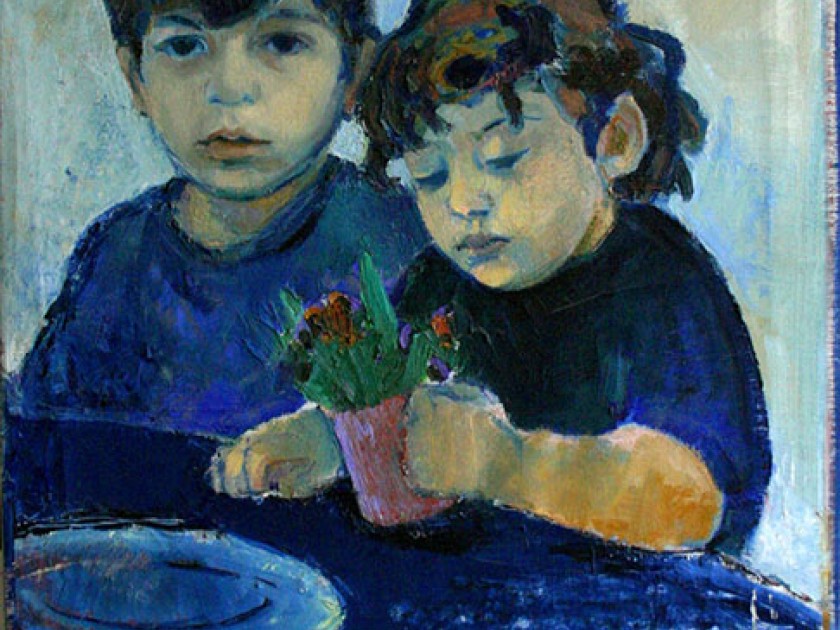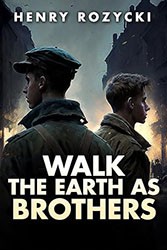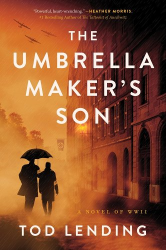
Portrait of Artist’s Children by Pia Ranslet via Wikimedia Commons
We read (and write) historical fiction for many reasons. We might do it to better understand where we come from, to learn from our mistakes, or even just to be entertained by stories set in different yet recognizable locales. But unlike genres such as science- or dystopian fiction, historical fiction relies on the stories of real people, the use of which can present a moral challenge.
In 1939, an estimated nine and a half million Jews lived in Europe. Six years later, only three and a half million were left. Now, only about 245,000 of those survivors are alive. What’s more, the youngest of them is seventy-nine. No eyewitnesses of the Holocaust will be left within the next few years.
As a result of efforts to collect the memories of those who lived through the horror, begun in earnest in the 1970s, tens of thousands of narratives are available as audio and video recordings. These join the testimonies that a few brave souls gave to the war crimes trials. Despite all of this, the Holocaust as a foundational part of our shared knowledge base is fading as quickly as the last survivors are dying.
I play a little mental game sometimes. I think of some music I have always loved, then double the number of years since I first heard it and test whether I liked or even knew music from that earlier time. For example, my introduction to Bruce Springsteen came fifty years ago, so what did I think about early 1920s music in 1974? That it was ancient, and nowhere near as good as what I listened to then and still play today. Similarly, no one has a father or grandfather anymore who can tell them about fighting in a war where the good guys and the bad guys were so easy to identify. Today, World War II feels historically equivalent to what World War I felt like to me. No wonder surveys show how many people lack even a basic knowledge about the Holocaust in the US. It is no longer connected to any lived experiences. Combine this with growing suspicions about authority and facts, and it becomes so much easier to sow doubt and even denial that the Holocaust even happened.
The challenge is how to keep the truth of the Holocaust alive and put that truth in front of as many people as possible, in ways that promote understanding and acceptance. Virtually no one would dare question a frail elderly woman of lying as she describes how SS soldiers threw her bedridden grandmother out of an upstairs window when they came to round up the family and send them to a death camp. Almost as effective might be a video of this testimony, followed by a discussion. Either way, it is a long and inefficient process to get these stories into tens of thousands of classrooms, year after year — not to mention the political resistance this would face. Only popular media can reach a large audience, and only drama or fiction can, paradoxically, provide the same emotional veracity that an eyewitness can. Examples include movies such as Schindler’s List and The Pianist, best-selling novels like The Book Thief and Sophie’s Choice, and television series like War and Remembrance and We Were the Lucky Ones.
This places a tremendous responsibility on writers, directors, and producers. The controversy over Heather Morris and her books, The Tattooist of Auschwitz and Cilka’s Journey, illustrates what can happen when questions are raised and amplified online. Conspiracy theorists, social media trolls, and Holocaust deniers seize on any question about accuracy to trumpet their claims that it is all exaggerated or untrue. Can those thousands of eyewitness accounts be used to fight such an insidious lie?
… only drama or fiction can, paradoxically, provide the same emotional veracity that an eyewitness can.
I faced this problem when I came to write my novel, Walk the Earth as Brothers. It is grounded in what happened to my father on the Western Front and my uncle in the East — yet my family chose to share almost nothing about their lives before 1945. If I wanted to use their stories as a foundation, I needed to fill in the huge holes created by their silence. For example, all Poles sent to the Gulag in 1939, when Russia invaded eastern Poland, were released soon after Germany attacked Russia two years later. My uncle was among them. Why did he next show up in Budapest and not join Anders Army in Iran? How did my father cross the Mediterranean and end up in Casablanca after the fall of France in 1940?
I spent months reading autobiographies and books of collected eyewitness accounts, and watched dozens of videos from the Shoah Foundation, Yad Vashem, and the US Holocaust Memorial Museum. I might not know what members of my family did at a particular place and time, but others reported very similar if not identical circumstances, so I put my characters into those stories. Two men wrote about how they were turned down when they tried to enlist in Anders Army because Jews were considered by some Polish officers unfit to serve, so that is what happened to the character based on my uncle.
When using others’ stories, I did not embellish, rearrange, or otherwise modify what they wrote or said. I used only what was needed for my story. Most importantly, I would always ask myself if I thought the person to whom these things had really happened would be offended by or displeased with what was written.
This is how we can keep the memories of those who died and those who survived alive, despite the Holocaust’s disappearance from consciousness and into history. We need facts, but we also need the impact of fiction. Those who, unlike my family, chose to give testimony have left us with the material out of which we can craft stories, but we must be responsible. Read and listen to the eyewitnesses, then use their accounts accurately. Don’t elaborate — sadly, the facts are as dramatic as anyone would need. Use survivors’ stories in service of them, to keep the truth about the Holocaust alive. In the end, honor their memories. I hope I did.
Henry Rozycki grew up in Montreal as the only child of Holocaust survivors. He began his studies at McGill University intending to become a writer but took a thirty-year detour into a career in medicine. Since returning to writing, his work has been published in literary journals, in magazines such as the Saturday Evening Post, and in newspapers, including the New York Times. He lives in Richmond, Virginia with his wife, Mary, and together they have seven children, four grandchildren and two dogs.



